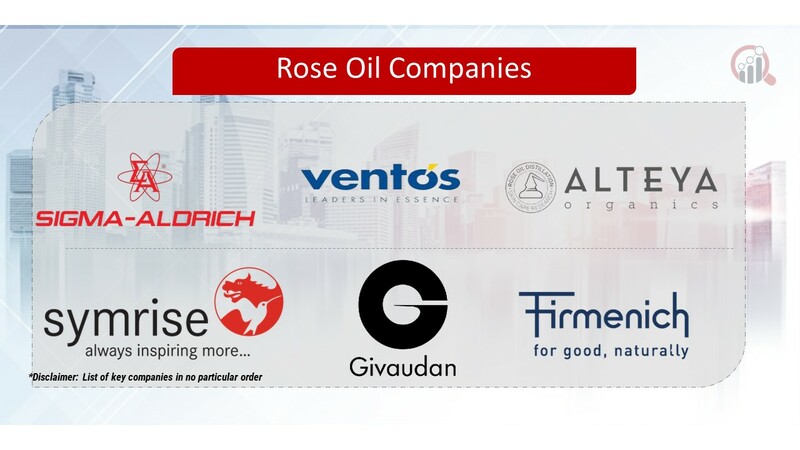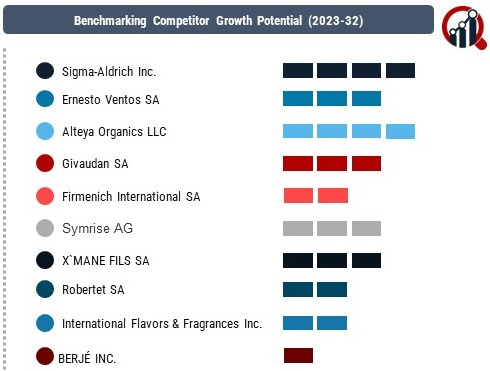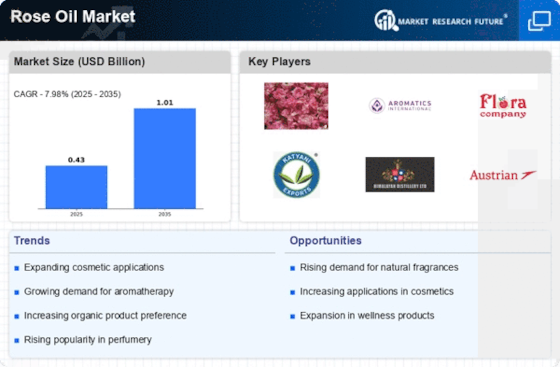Top Industry Leaders in the Rose Oil Market

Market share analysis in the rose oil segment is influenced by critical factors such as the quality and authenticity of the extracted oil, global supply chain efficiency, and the ability to meet the diverse needs of the fragrance and cosmetics industries. Pricing strategies play a pivotal role, with companies providing rose oil extracts across various price points to cater to diverse consumer preferences. Establishing strong relationships with rose cultivators, particularly in regions known for premium rose varieties, is essential for market share, ensuring a consistent and quality supply of raw materials.
While established players dominate the rose oil market, new and emerging companies are entering the industry with innovative approaches. These entrants often focus on niche markets, organic and sustainable extraction methods, and unique fragrance blends to carve a niche for themselves. The agility of these emerging companies allows them to swiftly adapt to changing consumer preferences, challenging the market dominance of established brands and contributing to the overall diversity of the market.
Industry news within the rose oil market frequently highlights developments in sustainable sourcing, technological advancements in extraction methods, and collaborations with cosmetic and fragrance brands. Companies regularly introduce new rose oil blends, incorporating trends such as natural and organic formulations. Regulatory updates related to environmental sustainability and fair trade practices shape industry dynamics, prompting companies to align their sourcing and extraction practices with evolving standards.
Current trends in company investments within the rose oil market reflect a notable focus on sustainability, technology integration, and community engagement. Companies allocate resources to implement eco-friendly and ethical sourcing practices, explore innovative extraction technologies, and invest in community development programs in regions where rose cultivation is prominent. Strategic marketing initiatives, including collaborations with beauty influencers and participation in industry events, are employed to strengthen brand presence and resonate with the target customer demographic. Investments in technology, such as blockchain for traceability and quality assurance, align with the growing demand for transparency in the fragrance industry.
The overall competitive scenario in the rose oil market remains dynamic, with companies navigating evolving consumer preferences, sustainability expectations, and technological advancements. Established players face the challenge of maintaining and enhancing the quality and authenticity of their rose oil extracts in a market where emerging companies are leveraging sustainable practices and unique blends to differentiate themselves. The competition is expected to intensify as new entrants gain recognition, introducing innovative extraction methods and challenging the market share of established brands. In this environment, adaptability, responsiveness to industry trends, and a commitment to sustainability will be crucial for companies to maintain and enhance their competitive positions in the rose oil market.
Industry News and Investment Landscape:
- Recent partnerships—such as Firmenich's with Turkish rose growers—highlight initiatives to ensure ethical and sustainable supply chains.
- Research and development expenditures have increased as rose oil's medicinal potential and applications in new markets such as nutraceuticals and functional beverages are explored.
- Market growth is fueled by rising public knowledge of rose oil's advantages thanks to media attention and celebrity endorsements.
Key Companies in the Rose Oil Market Include –
- Sigma-Aldrich Inc.
- Ernesto Ventos SA
- Alteya Organics LLC
- Givaudan SA
- Firmenich International SA
- Symrise AG
- X`MANE FILS SA
- Robertet SA
- International Flavors & Fragrances Inc.
- BERJÉ INC.










